Abstract
OBJECTIVE: The authors reviewed their experience with short-bowel syndrome to define the surgical approach to this problem in 160 patients. METHODS: Forty-eight adults and 112 children were evaluated over a 15-year period. RESULTS: Seventy-one patients (44%) adapted to resection and took enteral nutrition alone. Forty-four patients (28%) were supported by parenteral nutrition (PN). Forty-five patients (28%) have had 49 surgical procedures. Fifteen patients with adequate intestinal length (> 120 cm in adults) but dilated dysfunctional bowel underwent stricturoplasty (n = 4) or tapering (n = 11). Thirteen patients (87%) demonstrated clinical improvement. Fourteen patients with shorter remnants (90-120 cm) and rapid transit time received an artificial valve (n = 2) or a reversed segment (n = 1). All patients' conditions improved initially, but the reversed segment was revised or taken down. Fourteen patients with short remnants and dilated bowel underwent intestinal lengthening. Twelve patients' conditions improved (86%), one underwent transplantation, and one died. Sixteen patients with very short remnants (< 60 cm) and complications of PN underwent solitary intestine (n = 4) or combined liver-intestinal transplantation (n = 13). One-year graft survival was 65%. There have been five deaths. CONCLUSIONS: The surgical approach to short-bowel syndrome depends on the patient's age, remnant length and caliber, intestinal function, and PN-related complications. Nontransplant procedures have a role in the treatment of selected patients. Intestinal transplantation is emerging as a potential therapy for patients with significant PN-related complications.
Full text
PDF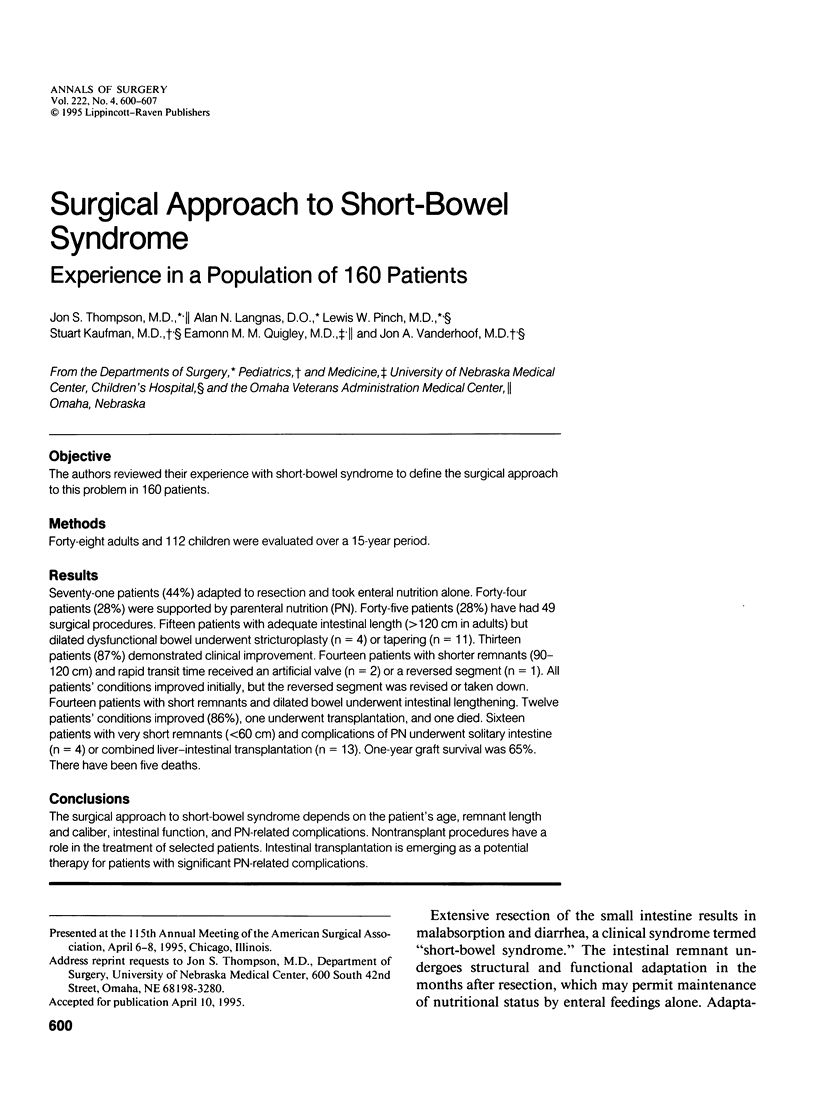
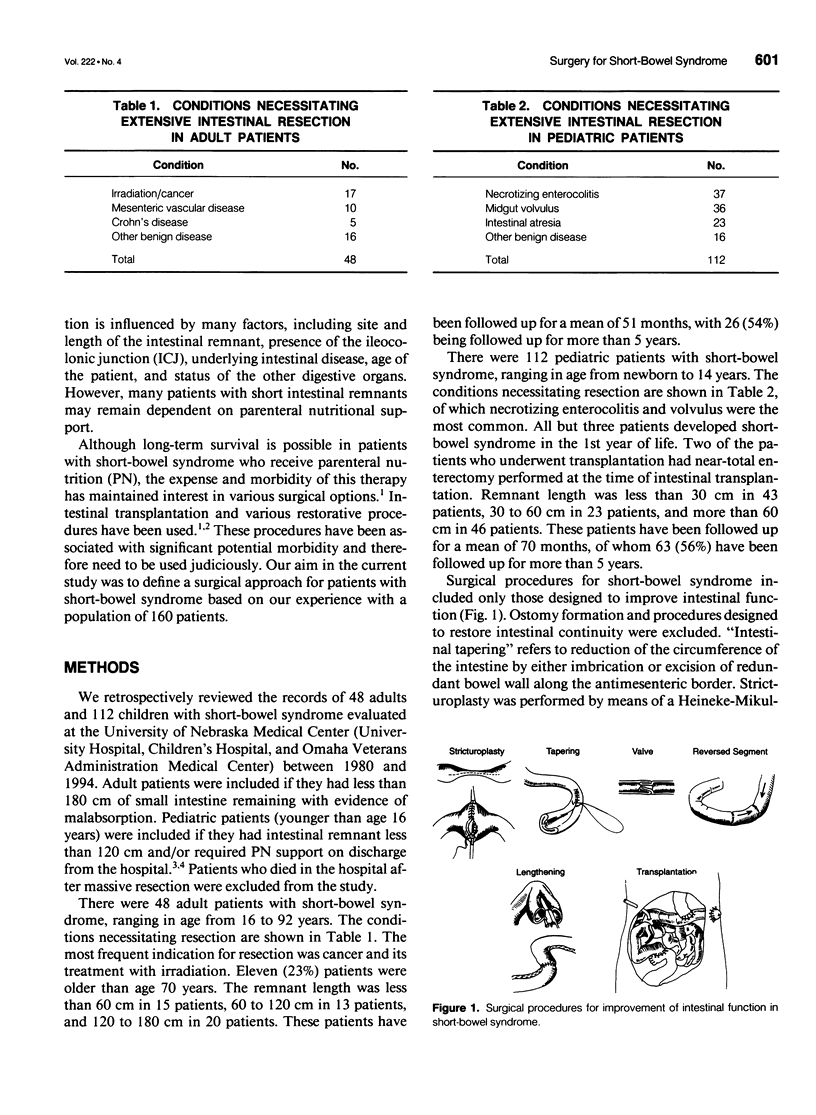
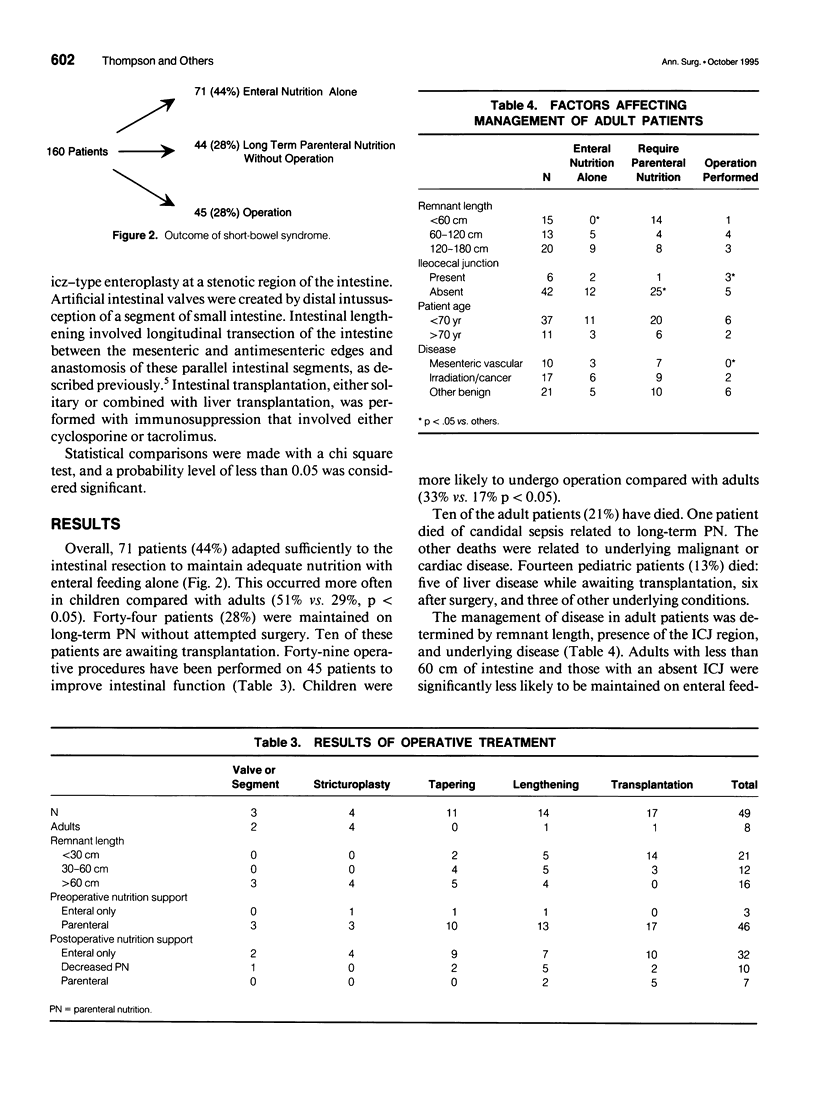
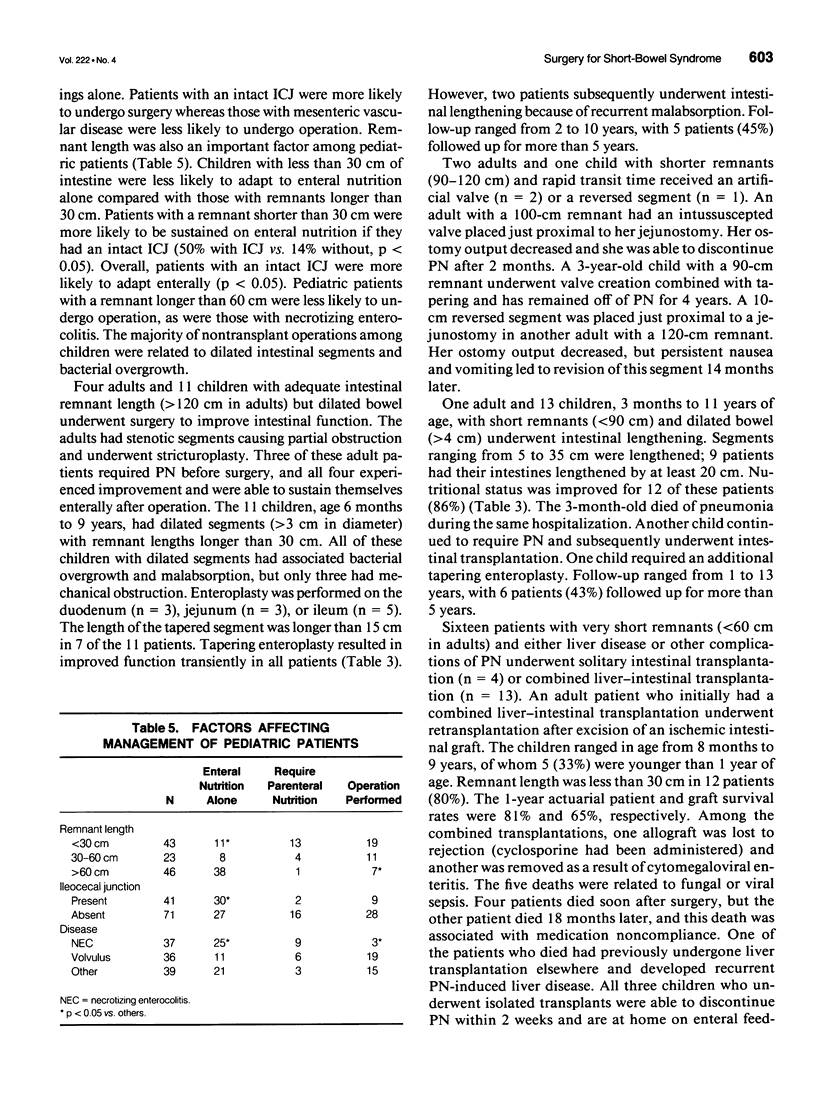
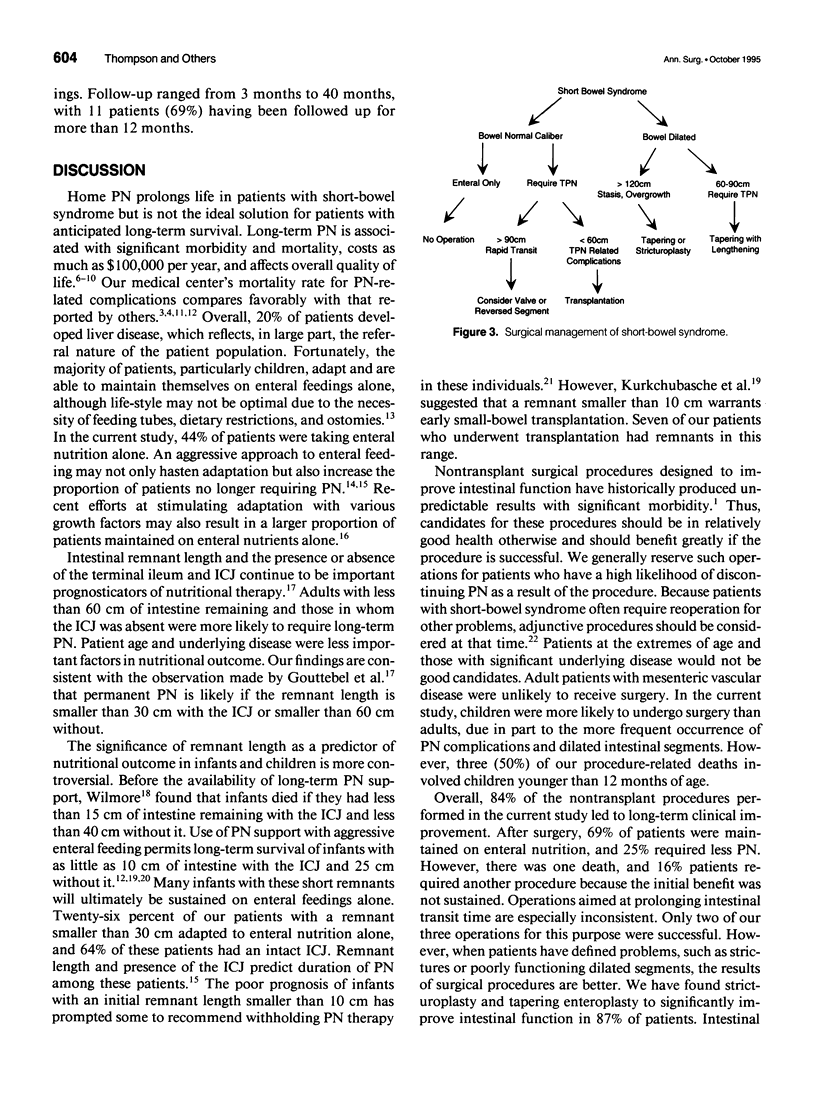
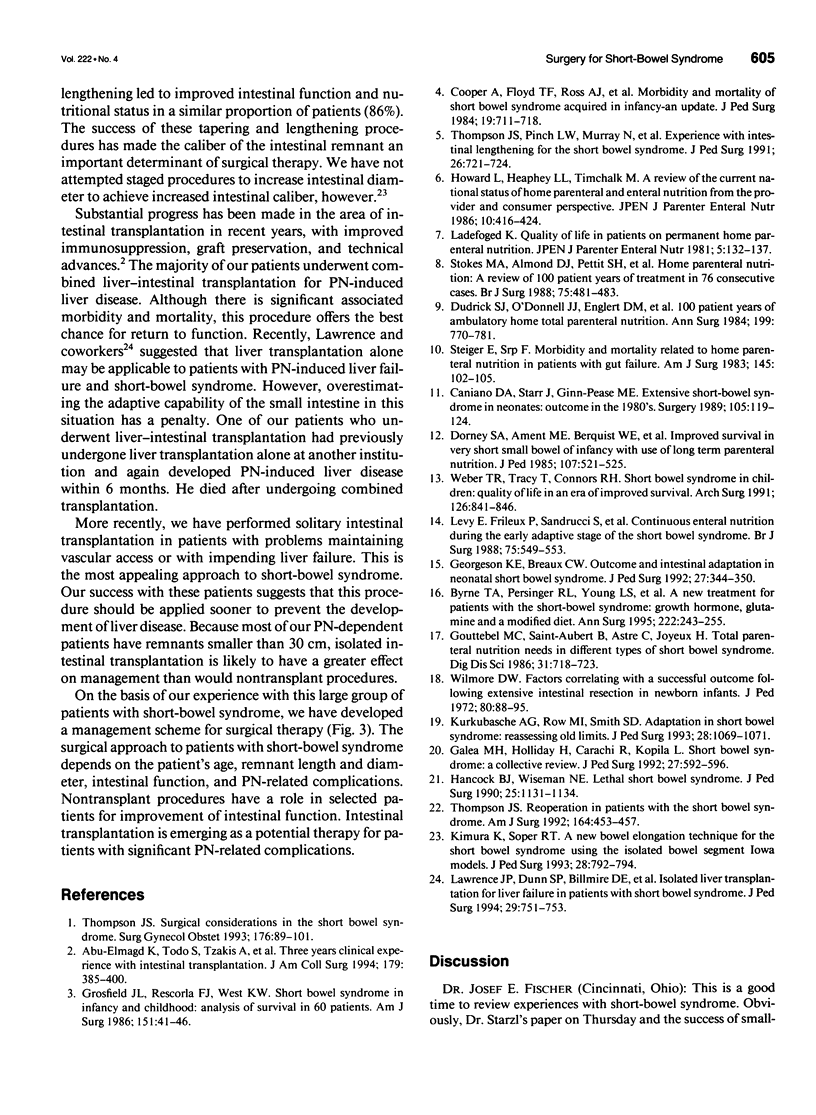
Selected References
These references are in PubMed. This may not be the complete list of references from this article.
- Abu-Elmagd K., Todo S., Tzakis A., Reyes J., Nour B., Furukawa H., Fung J. J., Demetris A., Starzl T. E. Three years clinical experience with intestinal transplantation. J Am Coll Surg. 1994 Oct;179(4):385–400. [PMC free article] [PubMed] [Google Scholar]
- Byrne T. A., Persinger R. L., Young L. S., Ziegler T. R., Wilmore D. W. A new treatment for patients with short-bowel syndrome. Growth hormone, glutamine, and a modified diet. Ann Surg. 1995 Sep;222(3):243–255. doi: 10.1097/00000658-199509000-00003. [DOI] [PMC free article] [PubMed] [Google Scholar]
- Caniano D. A., Starr J., Ginn-Pease M. E. Extensive short-bowel syndrome in neonates: outcome in the 1980s. Surgery. 1989 Feb;105(2 Pt 1):119–124. [PubMed] [Google Scholar]
- Cooper A., Floyd T. F., Ross A. J., 3rd, Bishop H. C., Templeton J. M., Jr, Ziegler M. M. Morbidity and mortality of short-bowel syndrome acquired in infancy: an update. J Pediatr Surg. 1984 Dec;19(6):711–718. doi: 10.1016/s0022-3468(84)80357-7. [DOI] [PubMed] [Google Scholar]
- Dorney S. F., Ament M. E., Berquist W. E., Vargas J. H., Hassall E. Improved survival in very short small bowel of infancy with use of long-term parenteral nutrition. J Pediatr. 1985 Oct;107(4):521–525. doi: 10.1016/s0022-3476(85)80008-1. [DOI] [PubMed] [Google Scholar]
- Dudrick S. J., O'Donnell J. J., Englert D. M., Matheny R. G., Blume E. R., Nutt R. E., Hickey M. S., Barroso A. O. 100 patient-years of ambulatory home total parenteral nutrition. Ann Surg. 1984 Jun;199(6):770–781. doi: 10.1097/00000658-198406000-00016. [DOI] [PMC free article] [PubMed] [Google Scholar]
- Galea M. H., Holliday H., Carachi R., Kapila L. Short-bowel syndrome: a collective review. J Pediatr Surg. 1992 May;27(5):592–596. doi: 10.1016/0022-3468(92)90455-g. [DOI] [PubMed] [Google Scholar]
- Georgeson K. E., Breaux C. W., Jr Outcome and intestinal adaptation in neonatal short-bowel syndrome. J Pediatr Surg. 1992 Mar;27(3):344–350. doi: 10.1016/0022-3468(92)90859-6. [DOI] [PubMed] [Google Scholar]
- Gouttebel M. C., Saint-Aubert B., Astre C., Joyeux H. Total parenteral nutrition needs in different types of short bowel syndrome. Dig Dis Sci. 1986 Jul;31(7):718–723. doi: 10.1007/BF01296449. [DOI] [PubMed] [Google Scholar]
- Grosfeld J. L., Rescorla F. J., West K. W. Short bowel syndrome in infancy and childhood. Analysis of survival in 60 patients. Am J Surg. 1986 Jan;151(1):41–46. doi: 10.1016/0002-9610(86)90009-7. [DOI] [PubMed] [Google Scholar]
- Hancock B. J., Wiseman N. E. Lethal short-bowel syndrome. J Pediatr Surg. 1990 Nov;25(11):1131–1134. doi: 10.1016/0022-3468(90)90747-w. [DOI] [PubMed] [Google Scholar]
- Howard L., Heaphey L. L., Timchalk M. A review of the current national status of home parenteral and enteral nutrition from the provider and consumer perspective. JPEN J Parenter Enteral Nutr. 1986 Jul-Aug;10(4):416–424. doi: 10.1177/0148607186010004416. [DOI] [PubMed] [Google Scholar]
- Kimura K., Soper R. T. A new bowel elongation technique for the short-bowel syndrome using the isolated bowel segment Iowa models. J Pediatr Surg. 1993 Jun;28(6):792–794. doi: 10.1016/0022-3468(93)90328-i. [DOI] [PubMed] [Google Scholar]
- Kurkchubasche A. G., Rowe M. I., Smith S. D. Adaptation in short-bowel syndrome: reassessing old limits. J Pediatr Surg. 1993 Aug;28(8):1069–1071. doi: 10.1016/0022-3468(93)90521-l. [DOI] [PubMed] [Google Scholar]
- Ladefoged K. Quality of life in patients on permanent home parenteral nutrition. JPEN J Parenter Enteral Nutr. 1981 Mar-Apr;5(2):132–137. doi: 10.1177/0148607181005002132. [DOI] [PubMed] [Google Scholar]
- Lawrence J. P., Dunn S. P., Billmire D. F., Falkenstein K., Vinocur C. D., Weintraub W. H. Isolated liver transplantation for liver failure in patients with short bowel syndrome. J Pediatr Surg. 1994 Jun;29(6):751–753. doi: 10.1016/0022-3468(94)90361-1. [DOI] [PubMed] [Google Scholar]
- Levy E., Frileux P., Sandrucci S., Ollivier J. M., Masini J. P., Cosnes J., Hannoun L., Parc R. Continuous enteral nutrition during the early adaptive stage of the short bowel syndrome. Br J Surg. 1988 Jun;75(6):549–553. doi: 10.1002/bjs.1800750615. [DOI] [PubMed] [Google Scholar]
- Steiger E., Srp F. Morbidity and mortality related to home parenteral nutrition in patients with gut failure. Am J Surg. 1983 Jan;145(1):102–105. doi: 10.1016/0002-9610(83)90174-5. [DOI] [PubMed] [Google Scholar]
- Stokes M. A., Almond D. J., Pettit S. H., Mughal M. M., Turner M., Shaffer J. L., Irving M. H. Home parenteral nutrition: a review of 100 patient years of treatment in 76 consecutive cases. Br J Surg. 1988 May;75(5):481–483. doi: 10.1002/bjs.1800750524. [DOI] [PubMed] [Google Scholar]
- Thompson J. S., Pinch L. W., Murray N., Vanderhoof J. A., Schultz L. R. Experience with intestinal lengthening for the short-bowel syndrome. J Pediatr Surg. 1991 Jun;26(6):721–724. doi: 10.1016/0022-3468(91)90019-p. [DOI] [PubMed] [Google Scholar]
- Thompson J. S. Reoperation in patients with the short bowel syndrome. Am J Surg. 1992 Nov;164(5):453–457. doi: 10.1016/s0002-9610(05)81179-1. [DOI] [PubMed] [Google Scholar]
- Thompson J. S. Surgical considerations in the short bowel syndrome. Surg Gynecol Obstet. 1993 Jan;176(1):89–101. [PubMed] [Google Scholar]
- Weber T. R., Tracy T., Jr, Connors R. H. Short-bowel syndrome in children. Quality of life in an era of improved survival. Arch Surg. 1991 Jul;126(7):841–846. doi: 10.1001/archsurg.1991.01410310051007. [DOI] [PubMed] [Google Scholar]
- Wilmore D. W. Factors correlating with a successful outcome following extensive intestinal resection in newborn infants. J Pediatr. 1972 Jan;80(1):88–95. doi: 10.1016/s0022-3476(72)80459-1. [DOI] [PubMed] [Google Scholar]


